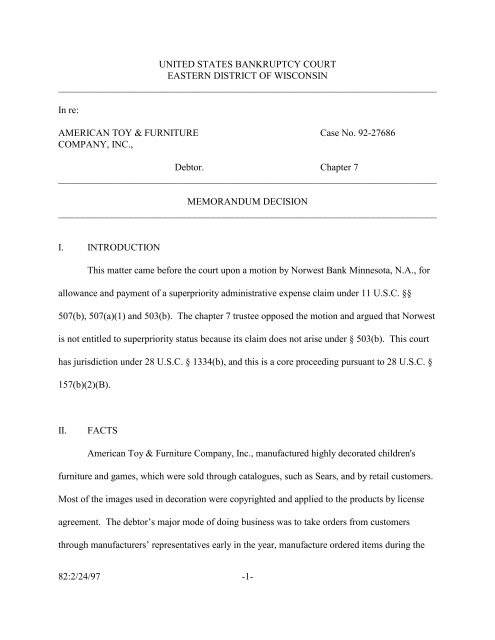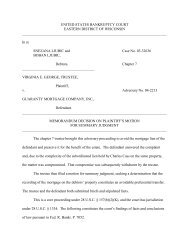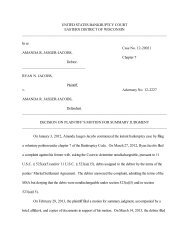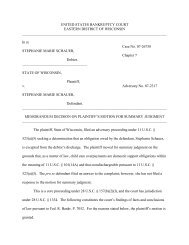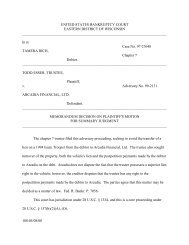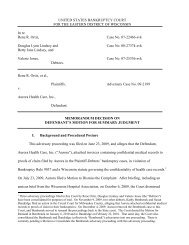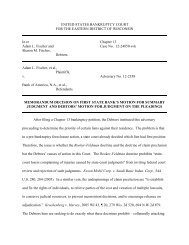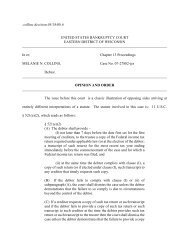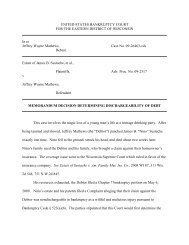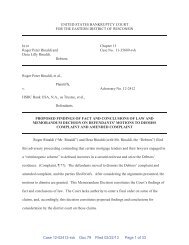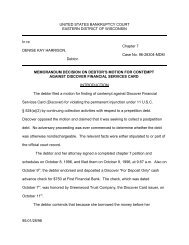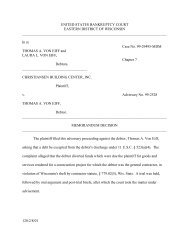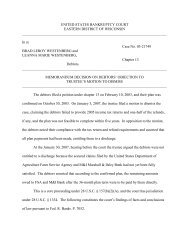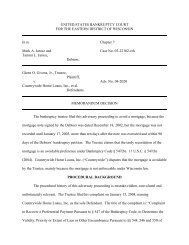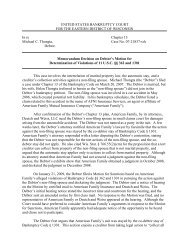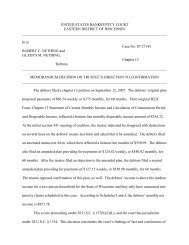In re American Toy & Furniture Co., Inc., Case No. 92-27686
In re American Toy & Furniture Co., Inc., Case No. 92-27686
In re American Toy & Furniture Co., Inc., Case No. 92-27686
You also want an ePaper? Increase the reach of your titles
YUMPU automatically turns print PDFs into web optimized ePapers that Google loves.
UNITED STATES BANKRUPTCY COURT<br />
EASTERN DISTRICT OF WISCONSIN<br />
______________________________________________________________________________<br />
<strong>In</strong> <strong>re</strong>:<br />
AMERICAN TOY & FURNITURE <strong>Case</strong> <strong>No</strong>. <strong>92</strong>-<strong>27686</strong><br />
COMPANY, INC.,<br />
Debtor. Chapter 7<br />
______________________________________________________________________________<br />
MEMORANDUM DECISION<br />
______________________________________________________________________________<br />
I. INTRODUCTION<br />
This matter came befo<strong>re</strong> the court upon a motion by <strong>No</strong>rwest Bank Minnesota, N.A., for<br />
allowance and payment of a superpriority administrative expense claim under 11 U.S.C. §§<br />
507(b), 507(a)(1) and 503(b). The chapter 7 trustee opposed the motion and argued that <strong>No</strong>rwest<br />
is not entitled to superpriority status because its claim does not arise under § 503(b). This court<br />
has jurisdiction under 28 U.S.C. § 1334(b), and this is a co<strong>re</strong> proceeding pursuant to 28 U.S.C. §<br />
157(b)(2)(B).<br />
II.<br />
FACTS<br />
<strong>American</strong> <strong>Toy</strong> & Furnitu<strong>re</strong> <strong>Co</strong>mpany, <strong>In</strong>c., manufactu<strong>re</strong>d highly decorated child<strong>re</strong>n's<br />
furnitu<strong>re</strong> and games, which we<strong>re</strong> sold through catalogues, such as Sears, and by <strong>re</strong>tail customers.<br />
Most of the images used in decoration we<strong>re</strong> copyrighted and applied to the products by license<br />
ag<strong>re</strong>ement. The debtor’s major mode of doing business was to take orders from customers<br />
through manufactu<strong>re</strong>rs’ <strong>re</strong>p<strong>re</strong>sentatives early in the year, manufactu<strong>re</strong> orde<strong>re</strong>d items during the<br />
82:2/24/97 -1-
spring and summer, and ship around October so the goods would be available for Christmas<br />
sales. These Christmas sales constituted most of the debtor’s seasonal business.<br />
<strong>In</strong> September 1989, the debtor had ente<strong>re</strong>d into a loan ag<strong>re</strong>ement with <strong>No</strong>rwest for<br />
<strong>re</strong>volver and term notes, of which over $5 million was due on the date the debtor filed for<br />
bankruptcy protection. <strong>American</strong> <strong>Toy</strong>’s indebtedness to <strong>No</strong>rwest was secu<strong>re</strong>d by a valid and<br />
properly perfected, first-priority security inte<strong>re</strong>st in all of its assets.<br />
On December 11, 19<strong>92</strong>, <strong>American</strong> <strong>Toy</strong> filed a voluntary petition for <strong>re</strong>lief under Chapter<br />
11 of the Bankruptcy <strong>Co</strong>de. On that same date, the debtor also filed a motion to use cash<br />
collateral and to provide adequate protection. <strong>No</strong>rwest, as the holder of the secu<strong>re</strong>d claim, filed a<br />
motion to terminate the automatic stay on December 28, 19<strong>92</strong>. Pending conclusion of a final<br />
hearing on these motions, the parties ente<strong>re</strong>d into a stipulation and the court signed an order on<br />
January 12, 1993, effective as of December 11, 19<strong>92</strong>, authorizing interim use of cash collateral<br />
and <strong>re</strong>quiring the debtor in possession to provide adequate protection.<br />
At the hearing on the motions, both the debtor and <strong>No</strong>rwest projected a profitable year.<br />
The bank’s expert testified that the debtor would have equity in the property at year-end if it<br />
<strong>re</strong>mained in business (Transcript of 1/26/93 hearing, p. 4). Based on the evidence p<strong>re</strong>sented, the<br />
court determined that the orderly liquidation value of the collateral would be between<br />
approximately $8 million and $12 million at various points in the year. See <strong>Co</strong>urt Minutes of the<br />
Hearing on January 26, 1993. The court denied <strong>No</strong>rwest’s motion and ente<strong>re</strong>d an order<br />
providing for use of cash collateral and adequate protection. Debtor’s actual cash on hand as of<br />
January 31, 1993, was $3,3<strong>92</strong>,039, with total cur<strong>re</strong>nt assets of $6,767,863.<br />
82:2/24/97 -2-
<strong>American</strong> <strong>Toy</strong> continued operations for over a year, during which time it obtained § 364<br />
borrowing and otherwise continued to use the collateral securing <strong>No</strong>rwest’s claim. The debtor<br />
paid <strong>No</strong>rwest adequate protection payments totaling $1,183,000. Ultimately, the debtor’s sales<br />
we<strong>re</strong> for much less than anticipated, and the debtor was unable to propose and obtain approval of<br />
a plan of <strong>re</strong>organization. The court granted <strong>No</strong>rwest’s motion for <strong>re</strong>lief from the automatic stay<br />
as of April 1, 1994. The debtor’s cash on hand at that time was $121,422, and total cur<strong>re</strong>nt assets<br />
equaled $2,741,041.<br />
Following liquidation of available collateral, <strong>No</strong>rwest <strong>re</strong>alized the net sum of $3,325,404,<br />
1<br />
leaving it with a shortfall of $2,174,596 on its secu<strong>re</strong>d claim of $5.5 million. The parties<br />
stipulated that this shortfall is the amount of <strong>No</strong>rwest's deficiency claim. While the <strong>re</strong>al estate<br />
and equipment <strong>re</strong>alized less than the original estimate, the primary cause of the shortfall was the<br />
consumption of cash and cur<strong>re</strong>nt assets during the year of operation as a debtor in possession,<br />
without a cor<strong>re</strong>sponding benefit in the amount of sales. Obviously, adequate protection proved<br />
to be anything but. <strong>No</strong>rwest contends it is entitled to a superpriority administrative expense<br />
claim under 11 U.S.C. §§ 507(b), 507(a)(1) and 503(b) for its loss <strong>re</strong>sulting from the debtor's use<br />
of its cash collateral.<br />
III.<br />
ARGUMENTS<br />
Both <strong>No</strong>rwest and the trustee ag<strong>re</strong>e that <strong>No</strong>rwest's deficiency claim of $2,174,596 does<br />
not prime other chapter 7 administrative expenses. 11 U.S.C. § 726(b). <strong>No</strong>rwest claims that it is<br />
1<br />
On March 30, 1994, the court approved a compromise between the parties which<br />
allowed <strong>No</strong>rwest’s claim in the amount of $5.5. million.<br />
82:2/24/97 -3-
entitled to superpriority status under 11 U.S.C. § 507(b), which grants such status to a secu<strong>re</strong>d<br />
c<strong>re</strong>ditor when the<strong>re</strong> is a failu<strong>re</strong> of adequate protection provided by the trustee, or in this case the<br />
debtor in possession, under §§ 362, 363 or 364. <strong>In</strong> <strong>re</strong> Becker, 51 B.R. 975, 978 (Bankr. D. Minn.<br />
1985). Section 507(b) provides:<br />
If the trustee, under section 362, 363, or 364 of this title, provides adequate protection of<br />
the inte<strong>re</strong>st of a holder of a claim secu<strong>re</strong>d by a lien on property of the debtor and if,<br />
notwithstanding such protection, such c<strong>re</strong>ditor has a claim allowable under subsection<br />
(a)(1) of this section arising from the stay of action against such property under section<br />
362 of this title, from the use, sale, or lease of such property under section 363 of this<br />
title, or from the granting of a lien under section 364(d) of this title, then such c<strong>re</strong>ditor’s<br />
claim under such subsection shall have priority over every other claim allowable under<br />
such subsection.<br />
11 U.S.C. § 507(b).<br />
According to <strong>No</strong>rwest, it must demonstrate the following elements to obtain superpriority status<br />
under § 507(b): (1) <strong>No</strong>rwest was a holder of a claim secu<strong>re</strong>d by a lien on property of the debtor;<br />
(2) <strong>No</strong>rwest was granted adequate protection under §§ 362, 363 or 364; and (3) notwithstanding<br />
such protection, <strong>No</strong>rwest has a claim allowable under § 507(a)(1), and by <strong>re</strong>fe<strong>re</strong>nce under<br />
§ 503(b), because the adequate protection <strong>re</strong>qui<strong>re</strong>d by imposition of the stay under § 362, the use,<br />
sale or lease of property under § 363, or the granting of a lien under § 364(d) was later found to<br />
be inadequate. See <strong>In</strong> <strong>re</strong> James B. Downing & <strong>Co</strong>., 94 B.R. 515, 520 (Bankr. N.D. Ill. 1988).<br />
<strong>No</strong>rwest asserts that it can satisfy these <strong>re</strong>qui<strong>re</strong>ments.<br />
The chapter 7 trustee opposes <strong>No</strong>rwest’s motion and contends that its claim is not entitled<br />
to superpriority status pursuant to § 507(b) because it does not arise under § 503(b); that is,<br />
<strong>No</strong>rwest’s claim is not a chapter 11 administrative expense. See <strong>In</strong> <strong>re</strong> Ralar Distributors, <strong>In</strong>c.,<br />
166 B.R. 3, 8 (Bankr. D. Mass. 1994), aff’d, 182 B.R. 81 (D. Mass. 1995), aff’d, 69 F.3d 1200<br />
82:2/24/97 -4-
st<br />
(1 Cir. 1995). To qualify for priority under § 507(a)(1), a necessary step befo<strong>re</strong> qualifying for<br />
superpriority under § 507(b), the claim must be an administrative expense claim under § 503(b).<br />
Section 503(b) provides that administrative claims include “the actual, necessary costs and<br />
expenses of p<strong>re</strong>serving the estate, including wages, salaries, or commissions for services<br />
<strong>re</strong>nde<strong>re</strong>d after the commencement of the case.” 11 U.S.C. § 503(b)(1)(A).<br />
The trustee points out that the Seventh Circuit has held “a claim will be afforded priority<br />
under § 503 if the debt both (1) ‘arise[s] from a transaction with the debtor-in-possession’ and (2)<br />
is ‘beneficial to the debtor-in-possession in the operation of the business.’” Matter of Jartran,<br />
th<br />
st<br />
<strong>In</strong>c., 732 F.2d 584, 587 (7 Cir. 1984) (quoting <strong>In</strong> <strong>re</strong> Mammoth Mart, <strong>In</strong>c., 536 F.2d 950, 954 (1<br />
Cir. 1976)). According to the trustee, <strong>No</strong>rwest’s claim does not satisfy the first criterion.<br />
IV.<br />
DISCUSSION<br />
A. 11 U.S.C. § 507<br />
Section 507 of the Bankruptcy <strong>Co</strong>de di<strong>re</strong>cts the allocation of a debtor’s assets by<br />
establishing a hierarchy of payments to c<strong>re</strong>ditors. C<strong>re</strong>ditors with a higher priority must be paid in<br />
full befo<strong>re</strong> c<strong>re</strong>ditors with a lower priority <strong>re</strong>ceive anything. Cf. SEC v. <strong>American</strong> Trailer Rentals<br />
<strong>Co</strong>., 379 U.S. 594, 611, 85 S.Ct. 513, 523 (1965). Secu<strong>re</strong>d c<strong>re</strong>ditors a<strong>re</strong> entitled to the benefit of<br />
their security. 11 U.S.C. §§ 362(d)(2), 363(e), 506. Administrative claimants a<strong>re</strong> paid first with<br />
unsecu<strong>re</strong>d funds. 11 U.S.C. § 507(a)(1). <strong>In</strong> this case, the <strong>re</strong>fe<strong>re</strong>nce to administrative claims is<br />
for chapter 11 expenses, as it is undisputed that chapter 7 expenses will be paid in full befo<strong>re</strong><br />
<strong>No</strong>rwest’s claim. The<strong>re</strong> will be sufficient funds to do so with funds derived primarily from the<br />
<strong>re</strong>covery of avoidable transfers. <strong>No</strong>rwest wishes to maximize its claim to funds available for<br />
82:2/24/97 -5-
chapter 11 administrative claimants by moving ahead of other chapter 11 administrative<br />
claimants. The<strong>re</strong> probably will not be sufficient funds for all c<strong>re</strong>ditors of this priority.<br />
Administrative claimants a<strong>re</strong> those entities having claims under 11 U.S.C. § 503(b). For<br />
our purposes, administrative claims include “the actual, necessary costs and expenses of<br />
p<strong>re</strong>serving the estate, including wages, salaries, or commissions for services <strong>re</strong>nde<strong>re</strong>d after the<br />
commencement of the case.” 11 U.S.C. § 503(b)(1)(A). An administrative claimant with<br />
superpriority under § 507(b) must be paid in full befo<strong>re</strong> any other administrative claimant of the<br />
same level of priority <strong>re</strong>ceives payment.<br />
The controversy associated with granting a superpriority to an inadequately protected<br />
secu<strong>re</strong>d c<strong>re</strong>ditor arises from the language of § 507(b), itself. <strong>In</strong> fact, § 507(b) has been called a<br />
“prism in the fog,” <strong>In</strong> <strong>re</strong> Callister, 15 B.R. 521, 526 (Bankr. D. Utah 1981); and the endeavor to<br />
determine whether an inadequately protected secu<strong>re</strong>d c<strong>re</strong>ditor should be granted a superpriority<br />
has been described as “a complex maze of ambiguous statutory provisions and opaque,<br />
inconsistent case law.” Baybank-Middlesex v. Ralar Distributors, <strong>In</strong>c., 69 F.3d 1200, 1202 (1 st<br />
Cir. 1995), aff’g <strong>In</strong> <strong>re</strong> Ralar Distributors, <strong>In</strong>c., 166 B.R. 3, 4 (Bankr. D. Mass. 1994)<br />
(“Resolution of the controversy involves application of the obscu<strong>re</strong> language of section 507(b) to<br />
the elusive concept of adequate protection.”).<br />
To further the confusion, § 361(3) of the <strong>Co</strong>de prohibits granting adequate protection to a<br />
secu<strong>re</strong>d c<strong>re</strong>ditor in the form of an administrative expense:<br />
When adequate protection is <strong>re</strong>qui<strong>re</strong>d . . . of an inte<strong>re</strong>st of an entity in property, such<br />
adequate protection may be provided by —<br />
(1) <strong>re</strong>quiring the trustee to make a cash payment . . .;<br />
(2) providing to such entity an additional or <strong>re</strong>placement lien . . .; or<br />
(3) granting such other <strong>re</strong>lief, other than entitling such entity to compensation<br />
82:2/24/97 -6-
allowable under section 503(b)(1) of this title as an administrative expense, as<br />
will <strong>re</strong>sult in the <strong>re</strong>alization by such entity of the indubitable equivalent of such<br />
entity’s inte<strong>re</strong>st in such property.<br />
11 U.S.C. § 361 (emphasis added). <strong>Co</strong>nsequently, a court cannot grant administrative status to a<br />
secu<strong>re</strong>d c<strong>re</strong>ditor prospectively as adequate protection; it may only do so <strong>re</strong>troactively after<br />
adequate protection proves to have been inadequate. <strong>In</strong> other words, to achieve superpriority,<br />
the secu<strong>re</strong>d c<strong>re</strong>ditor must not only have been inadequately protected, its claim must qualify for<br />
administrative priority, even though it could not have <strong>re</strong>ceived administrative priority as adequate<br />
protection.<br />
The legislative history of the statute is similarly murky. The House version of the<br />
Bankruptcy Reform Act initially provided in § 361(3) that adequate protection could be provided<br />
th<br />
st<br />
by granting an administrative expense to the c<strong>re</strong>ditor. H.R. 8200, 95 <strong>Co</strong>ng., 1 Sess., § 361(3)<br />
th<br />
nd<br />
(1977). However, the Senate Bill did not contained a similar provision. S. 2266, 95 <strong>Co</strong>ng., 2<br />
Sess. (1978). Neither bill contained the p<strong>re</strong>sent § 507(b). Sections 507(b) and 361(3) first<br />
appea<strong>re</strong>d in their p<strong>re</strong>sent form in the compromise that became the Bankruptcy <strong>Co</strong>de:<br />
Section 507(b) of the House amendment is new and is derived from the compromise<br />
contained in the House amendment with <strong>re</strong>spect to adequate protection under section 361.<br />
Subsection (b) provides that to the extent adequate protection of the inte<strong>re</strong>st of a holder of<br />
a claim proves to be inadequate, then the c<strong>re</strong>ditor’s claim is given priority over every<br />
other allowable claim entitled to distribution under section 507(a).<br />
124 <strong>Co</strong>ng. Rec. 32,398 (1978). This statement by <strong>Co</strong>ng<strong>re</strong>ssman Don Edwards, which would<br />
indicate cong<strong>re</strong>ssional intent, conflicts with the actual language § 507(b). See <strong>In</strong> <strong>re</strong> Five Star<br />
Partners, L.P., 193 B.R. 603, 610 n. 2 (Bankr. N.D. Ga. 1996) (“It should be noted that the<br />
prohibition in section 361(3) against use of an administrative expense claim as a form of<br />
adequate protection applies only in the first instance. Section 361(3) does not bar a court from<br />
82:2/24/97 -7-
granting an administrative expense claim after a failu<strong>re</strong> of adequate protection al<strong>re</strong>ady provided<br />
by the trustee.”); Ralar Distributors, <strong>In</strong>c., 166 B.R. at 6, 8. Although legislative history would<br />
suggest that <strong>Co</strong>ng<strong>re</strong>ss wanted to protect p<strong>re</strong>petition lenders who have no administrative expense<br />
claim in the first instance, the statute <strong>re</strong>qui<strong>re</strong>s that the claim be allowable under § 507(a)(1),<br />
which applies to postpetition expenses. The fundamental basis for statutory interp<strong>re</strong>tation is the<br />
language of the statute itself. Pennsylvania Dept. of Public Welfa<strong>re</strong> v. Davenport, 495 U.S. 552,<br />
557-58, 110 S.Ct. 2126, 2130 (1990). Thus, the court must go back to the language of § 507 for<br />
guidance.<br />
The<strong>re</strong> a<strong>re</strong> numerous cases holding that a secu<strong>re</strong>d c<strong>re</strong>ditor is entitled to a superpriority<br />
simply because the adequate protection provided to the c<strong>re</strong>ditor proved to be inadequate. E.g.,<br />
th<br />
Grundy Nat’l Bank v. Rife, 876 F.2d 361, 363-64 (4 Cir. 1989); <strong>In</strong> <strong>re</strong> James B. Downing & <strong>Co</strong>.,<br />
94 B.R. 515, 520 (Bankr. N.D. Ill. 1988); <strong>In</strong> <strong>re</strong> Callister, 15 B.R. 521, 528 (Bankr. D. Utah<br />
1981). However, § 507(b) provides that inadequate protection is not enough by itself. The<br />
claimant must have an allowable administrative expense claim pursuant to § 503(b).<br />
B. 11 U.S.C. § 503(b)<br />
<strong>Co</strong>urts have diffe<strong>re</strong>d in their analysis and conclusions as to whether compensation of a<br />
secu<strong>re</strong>d c<strong>re</strong>ditor is a valid administrative expense. Section 503(b)(1)(A), which for our purposes<br />
is the only applicable subsection of § 503(b), provides that administrative claims include “the<br />
actual, necessary costs and expenses of p<strong>re</strong>serving the estate, including wages, salaries, or<br />
commissions for services <strong>re</strong>nde<strong>re</strong>d after the commencement of the case.” The trustee contends<br />
that the court should follow the criteria used to assess administrative claims established by the<br />
82:2/24/97 -8-
First and Seventh Circuits.<br />
st<br />
The First Circuit in <strong>In</strong> <strong>re</strong> Mammoth Mart, <strong>In</strong>c., 536 F.2d 950 (1 Cir. 1976) (ruling under<br />
the Bankruptcy Act), articulated guidelines used to determine whether an expense is given<br />
administrative priority. First, the debt must arise from a transaction with the debtor in<br />
possession. Second, the transaction must be beneficial to the debtor in possession in the<br />
operation of its business. Id. at 954; see also <strong>In</strong> <strong>re</strong> United Trucking Service, <strong>In</strong>c., 851 F.2d 159,<br />
th<br />
161-62 (6 Cir. 1988).<br />
The trustee does not dispute the second <strong>re</strong>qui<strong>re</strong>ment, and this court ag<strong>re</strong>es. The debtor’s<br />
use of assets and cash benefitted the estate — the debtor stayed in business for a year. <strong>No</strong>rwest’s<br />
claim is primarily for consumption of liquid assets, and less so for dep<strong>re</strong>ciation in value or<br />
mistake in valuation of a particular secu<strong>re</strong>d asset. Cf. Matter of Plunkett, 191 B.R. 768, 780<br />
th<br />
(Bankr. E.D. Wis. 1995), aff’d, 82 F.3d 738 (7 Cir. 1996) (holding that c<strong>re</strong>ditor’s expense of not<br />
fo<strong>re</strong>closing on income producing property was not “actual and necessary” cost of p<strong>re</strong>serving the<br />
estate because no benefit accrued to the estate). The Plunkett court noted that to be an “actual<br />
and necessary” cost of p<strong>re</strong>serving the estate, an expenditu<strong>re</strong> must benefit the estate as a whole.<br />
Id. (citing Jartran, 886 F.2d at 871). Thus, “the<strong>re</strong> must be some net benefit to the estate or a<br />
p<strong>re</strong>servation of the status quo after the costs to the c<strong>re</strong>ditor and the benefits to the estate a<strong>re</strong> taken<br />
into account.” Id. The c<strong>re</strong>ditor’s cost provided no net benefit to the Plunkett estate, nor did it<br />
have any effect on the status quo. The loss <strong>re</strong>lated solely to one asset, not to the enti<strong>re</strong> estate.<br />
Thus, Plunkett is distinguishable because he<strong>re</strong> the collateral was used by an operating entity that<br />
comprised the enti<strong>re</strong> estate at the time. Real estate is a passive investment, but the debtor was<br />
engaged in active production. <strong>American</strong> <strong>Toy</strong> took raw materials and added value by<br />
82:2/24/97 -9-
manufacturing those goods into a product, which it sold to produce accounts <strong>re</strong>ceivable. The<br />
debtor used <strong>No</strong>rwest’s collateral for the benefit of the enti<strong>re</strong> estate, even though the benefit was<br />
not enough to save the debtor.<br />
Other courts have been mo<strong>re</strong> expansive than Plunkett in what is deemed to have<br />
benefitted the estate. The court in <strong>In</strong> <strong>re</strong> Five Star Partners, L.P., 193 B.R. 603, 613 (Bankr. N.D.<br />
Ga. 1996), applied a two part test similar to Jartran to determine whether a claim qualified as an<br />
administrative expense. The court noted:<br />
“The priority of an administrative expense is the highest. 11 U.S.C. § 507(a)(1). The<br />
allowance of such a priority is to be ca<strong>re</strong>fully conside<strong>re</strong>d, only after notice and hearing.<br />
11 U.S.C. § 503. That which is actually utilized by a trustee in the operation of a debtor’s<br />
business is a necessary cost and expense of p<strong>re</strong>serving the estate and should be accorded<br />
the priority of an administrative expense. That which is thought to have some potential<br />
benefit, in that it makes a business mo<strong>re</strong> likely saleable, may be a benefit but is too<br />
speculative to be allowed as an ‘actual, necessary cost and expense of p<strong>re</strong>serving the<br />
estate.’”<br />
th<br />
Id. (quoting <strong>In</strong> <strong>re</strong> Subscription Television of G<strong>re</strong>ater Atlanta, 789 F.2d 1530, 1532 (11 Cir.<br />
1986)). The secu<strong>re</strong>d assets we<strong>re</strong> actually utilized in the operation of <strong>American</strong> <strong>Toy</strong>’s business.<br />
The use of the collateral by the debtor was not to make the business mo<strong>re</strong> saleable, it was to buy<br />
raw materials and to pay labor for the manufactu<strong>re</strong> of those materials.<br />
The deficiency asserted by <strong>No</strong>rwest must also arise from a transaction with <strong>American</strong><br />
<strong>Toy</strong>. <strong>Co</strong>urts have also interp<strong>re</strong>ted this <strong>re</strong>qui<strong>re</strong>ment diffe<strong>re</strong>ntly. The court in Matter of Jartran,<br />
th<br />
<strong>In</strong>c., 732 F.2d 584 (7 Cir. 1984), explained the rationale for its interp<strong>re</strong>tation of § 503:<br />
The policies underlying the provisions of § 503 . . . a<strong>re</strong> not hard to discern. If a<br />
<strong>re</strong>organization is to succeed, c<strong>re</strong>ditors asked to extend c<strong>re</strong>dit after the petition is filed<br />
must be given priority so they will be moved to furnish the necessary c<strong>re</strong>dit to enable the<br />
bankrupt to function. Thus, “[w]hen third parties a<strong>re</strong> induced to supply goods or services<br />
to the debtor-in-possession . . . the purposes of [§ 503] plainly <strong>re</strong>qui<strong>re</strong> that their claims be<br />
afforded priority.” Without a provision like § 503, efforts to <strong>re</strong>organize would be<br />
82:2/24/97 -10-
hampe<strong>re</strong>d by the necessity of advance payment for all goods and services supplied to the<br />
estate since p<strong>re</strong>sumably no c<strong>re</strong>ditor would willingly assume the status of a non-priority<br />
c<strong>re</strong>ditor to a debtor undergoing <strong>re</strong>organization.<br />
Id. at 586 (citations omitted; quoting Mammoth Mart, 536 F.2d at 954). Both Mammoth Mart<br />
and Jartran held that voluntary inducement is <strong>re</strong>qui<strong>re</strong>d for an expense to be adjudicated an<br />
administrative claim. See also <strong>In</strong> <strong>re</strong> Ralar Distributors, <strong>In</strong>c., 166 B.R. 3 (Bank. D. Mass. 1994),<br />
aff’d, 182 B.R. 81 (D. Mass. 1995), aff’d sub nom. Baybank-Middlesex v. Ralar Distributors,<br />
st<br />
<strong>In</strong>c., 69 F.3d 1200 (1 Cir. 1995). He<strong>re</strong>, <strong>No</strong>rwest’s participation in the debtor’s attempted<br />
<strong>re</strong>organization was anything but voluntary.<br />
The court in Ralar Distributors, <strong>In</strong>c., 166 B.R. 3, denied a secu<strong>re</strong>d c<strong>re</strong>ditor a superpriority<br />
claim because it was unable to show that the debtor’s use or sale of collateral caused a decline in<br />
value of the collateral. Such a decline clearly occur<strong>re</strong>d in this case. The Ralar court also<br />
concluded that superpriority claims a<strong>re</strong> only allowed for those c<strong>re</strong>ditors who ag<strong>re</strong>e to extend<br />
postpetition c<strong>re</strong>dit to the bankruptcy estate as a loan or by furnishing goods or services. Id. at 8.<br />
It must be noted, however, that the statute does not <strong>re</strong>qui<strong>re</strong> a voluntary transaction.<br />
The Eleventh Circuit held that “[t]he negotiation for continued possession of the<br />
[collateral] in <strong>re</strong>turn for adequate protection is a post-petition transaction providing new value to<br />
th<br />
the bankruptcy estate.” <strong>In</strong> <strong>re</strong> Carpet Center Leasing <strong>Co</strong>., 991 F.2d 682, 687 (11 Cir. 1993)<br />
(c<strong>re</strong>ditor held security inte<strong>re</strong>st in debtor’s fleet of tractors). The Carpet Center court<br />
distinguished Jartran:<br />
<strong>In</strong> [Jartran], the debtor enjoyed the benefits of advertising services that we<strong>re</strong> performed<br />
on the basis of p<strong>re</strong>-petition contracts. The advertising service provider claimed<br />
entitlement to administrative priority for the cost of providing the ads, but the Seventh<br />
Circuit <strong>Co</strong>urt of Appeals held that the debtor engaged in no post-petition transaction<br />
which induced the provision of the ads because the commitment to provide the ads was<br />
82:2/24/97 -11-
formed befo<strong>re</strong> the debtor filed its bankruptcy petition. <strong>In</strong> this case, by contrast, Debtor<br />
induced the post-petition provision of goods to the estate by negotiating for <strong>re</strong>tention of<br />
the trucks, otherwise subject to <strong>re</strong>possession, in <strong>re</strong>turn for adequate protection payments.<br />
Rather than simply enjoying the benefits of a p<strong>re</strong>-petition commitment, Debtor actively<br />
bargained for the use of the tractors after filing its bankruptcy petition.<br />
Id. (citation omitted).<br />
This court ag<strong>re</strong>es with the analysis set forth by Carpet Center and believes that this case<br />
is likewise distinguishable from Jartran. <strong>American</strong> <strong>Toy</strong> enjoyed the use of <strong>No</strong>rwest’s collateral<br />
throughout its postpetition operation, and this use constitutes a postpetition transaction. The<strong>re</strong><br />
was an early ag<strong>re</strong>ement between the debtor and <strong>No</strong>rwest for interim use of cash collateral for a<br />
short time pending the outcome of a final hearing on <strong>No</strong>rwest’s motion for <strong>re</strong>lief from the<br />
automatic stay, and the debtor consented to pay adequate protection. This was clearly a<br />
postpetition voluntary transaction between the debtor and secu<strong>re</strong>d c<strong>re</strong>ditor. When the court<br />
denied <strong>No</strong>rwest’s motion to lift the stay, it was induced to provide cash collateral to the debtor,<br />
albeit involuntarily. The involuntary natu<strong>re</strong> of the process does not negate the fact that <strong>No</strong>rwest<br />
and the debtor engaged in a postpetition transaction, unlike Jartran, providing new value to the<br />
estate. It would be strange indeed if <strong>No</strong>rwest we<strong>re</strong> entitled to superpriority only if it ag<strong>re</strong>ed to<br />
the use of cash collateral (which it did briefly), but it would be denied superpriority under the<br />
same economic circumstances if it litigated its rights and was forced by court order to put its<br />
inte<strong>re</strong>sts at risk. Section 707(b) has no such <strong>re</strong>qui<strong>re</strong>ment. <strong>No</strong>rwest is entitled to an<br />
administrative expense priority.<br />
One court held that a similar interp<strong>re</strong>tation of § 507(b) “conflicts with the policy of<br />
encouraging suppliers to extend post-petition c<strong>re</strong>dit by giving their claims first priority,” and<br />
consequently, “suppliers may be discouraged from providing goods and services on c<strong>re</strong>dit to the<br />
82:2/24/97 -12-
debtor.” Five Star Partners, 193 B.R. at 612. This court disag<strong>re</strong>es. The debtor is using the<br />
c<strong>re</strong>ditor’s cash collateral as it is using the goods supplied by the trade c<strong>re</strong>ditor. The act of<br />
consuming cash and accounts <strong>re</strong>ceivable <strong>re</strong>sults in taking the secu<strong>re</strong>d c<strong>re</strong>ditor’s money and using<br />
it to pay trade c<strong>re</strong>ditors. Thus, trade c<strong>re</strong>ditors have the advantage of consumption of the<br />
collateral as it is used to provide goods and services for the debtor, the classic example of an<br />
administrative expense.<br />
V. CONCLUSION<br />
Based upon this analysis, the motion of <strong>No</strong>rwest Bank Minnesota, N.A., for payment of a<br />
superpriority administrative expense claim pursuant to 11 U.S.C. §§ 507(b), 507(a)(1) and 503(b)<br />
is granted.<br />
Dated at Milwaukee, Wisconsin, February 24, 1997.<br />
BY THE COURT<br />
___/s/__________________________<br />
Honorable Marga<strong>re</strong>t Dee McGarity<br />
United States Bankruptcy Judge<br />
82:2/24/97 -13-


